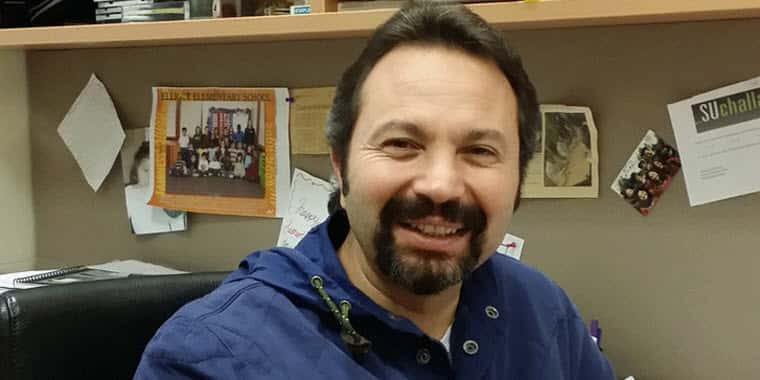by Jenny Lavey, MSU News Service
BOZEMAN – The head of a plant genetics and genomics team at an international university who is considered a world leader in cereal genetics has been chosen as Montana State University’s first Montana Plant Sciences Chair.
Hikmet Budak from Sabanci University in Istanbul, Turkey, was selected for the position after a national search. He will begin at MSU in January.
Budak will be the first endowed chair in the history of the MSU College of Agriculture and Montana Agricultural Experiment Station, or MAES. The idea for the position began more than three years ago from the Montana Grains Foundation as a charge to help Montana’s wheat farmers stay sustainable and remain competitive. It has since grown into a vision for expanding statewide support for Montana’s grain growers with the help of MSU faculty and the Montana Grains Foundation. Budak is expected to build a significant integrative research program addressing Montana’s challenges in the grains industry. The Montana Grains Foundation is the educational and philanthropic arm of the Montana Grain Growers Association.
“I am delighted to be the inaugural Montana Plant Sciences Chair housed at Montana State University,” Budak said. “I’m very much looking forward to joining the university, stakeholders and producers to develop a research program that has the capacity to make an instrumental difference in the state’s highest-grossing industry.”
Currently a professor of plant genetics at Sabanci University, Budak serves as the lead of the plant genetics and genomics team in the university’s biological sciences and bioengineering program. He earned a doctorate in agronomy from the University of Nebraska. He also has been actively involved in leadership for wheat improvement projects sponsored by the European Union.
The endowed chair will be a member of the MSU Department of Plant Sciences and Plant Pathology. Along with MAES, the department conducts research addressing challenges for Montana’s agricultural industry. Sustained by permanently invested funds, endowed chairs – which are often the highest academic award universities bestow on faculty – provide predictable and stable funding to help the university build upon its existing academic and research programs. Budak will work with an advisory council made up of representatives from Montana’s cereal grains production industry and will actively collaborate with breeders, entomologists and plant pathologists in integrative research.
One of Budak’s central priorities will include researching new genetically based management strategies for the wheat stem sawfly, an aggressive insect that has had devastating effects on wheat production in North America. The U.S. Department of Agriculture has estimated a gross national loss of $350 million, with 2012 losses in Montana estimated around $80 million. A study from MSU’s Department of Agricultural Economics and Economics found that in some cases, individual Montana wheat farms lost up to $120,000 the same year. The sawfly’s ability to adapt to changing environmental and production conditions over the past few decades has made it one of the greatest threats to wheat producers in Montana and the Northern Great Plains region, according to MSU Agricultural Economics Professor Anton Bekkerman.
Charles Boyer, MSU vice president of agriculture, said he’s looking forward to supporting Budak’s research goals.
“We are pleased to welcome Dr. Budak to Montana, our College of Agriculture and Experiment Station,” Boyer said. “He brings a wealth of global knowledge and research in genetics and bioengineering and will be a central asset in leveraging the capacity of our plant science faculty we currently have at MSU. This position holds great promise for Montana’s grain industry and we are looking forward to working closely alongside our private stakeholders and producers to elevate and sustain the cereal grains industry across the state.”
More than 60 Montana grain producers and several agribusinesses have partnered to support the endowed chair, with a goal of raising $5 million. To date, joint fundraising efforts by the Montana Grains Foundation and the MSU Alumni Foundation have raised more than $2.6 million, according to Kevin Brown, MSU alumni foundation senior development director. Fundraising plans will continue this fall until the $5 million goal is met, according to Brown.
Lochey Edwards, a third generation wheat farmer from Big Sandy, has been involved along with the MSU Alumni Foundation in generating support for the plant sciences chair. Edwards and colleagues saw a need for an enhanced research focus on Montana grain production and began to conceptualize plans for the chair with the MSU Alumni Foundation in 2012.
“We’ve come a long way since our first conversation about how to better support research and education for the grains industry,” said Edwards, who is past president of the Montana Grain Growers Association, current board member of the Montana Grains Foundation and previous chair of Domestic Policy of the National Association for Wheat Growers.
“I believe the chair will be a great asset not only to the university but to the Montana grain producer community,” Edwards added. “As a community we are looking forward to working with the chair to find new solutions to both old and new production challenges for industry.”
Montana has the most land-grant universities in the nation, with seven tribal colleges and MSU, the state’s largest land-grant institution. MAES has seven research centers located across the state that address production challenges in regard to crop and animal production, pest management, agricultural water management and market growth.
For additional information on the Montana Plant Sciences Chair, please contact Kevin Brown at (406) 994-4815 or kevin.brown@msuaf.org.
Source: MSU News
image by gazetesu.sabanciuniv.edu


